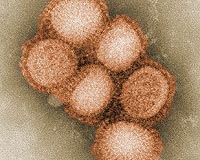| . |  |
. |
Beijing (AFP) May 14, 2009 Six years after its sluggish response to SARS, China has been criticised for overreacting to swine flu, showing it has not yet found the right prescription for dealing with a health crisis, experts said. With memories of the Severe Acute Respiratory Disease outbreak still fresh, China reacted quickly and aggressively to prevent swine flu, or the A(H1N1) virus, from reaching its soil. But experts say while China has learned from its attempted cover-up of the more deadly SARS in 2003, it has upset other countries by miscalculating the severity of the swine flu threat. "The Chinese leaders do not understand the need to avoid overreaction," said Cheng Li, a China scholar at the Brookings Institution, a Washington think tank. "Their understanding of the foreign media and foreign public opinion has always been astonishingly inadequate." China has aggressively screened incoming foreigners, suspended flights to and from Mexico -- where the virus first emerged -- and quarantined many foreigners. Mexico complained bitterly at the Chinese moves, saying Beijing was discriminating against its citizens by quarantining them even when they had no flu symptoms and had not travelled from Mexico. Canadian officials have raised similar concerns. Such measures were imposed despite warnings from the World Health Organization (WHO) that they would have "very little effect" in containing the virus. China and its southern territory of Hong Kong have so far confirmed four cases, all of them involving travellers who had been in flu-hit countries. "China's swift and decisive action indicated the government had learned from the SARS episode that cover-up or inaction was not only impossible, but counterproductive," said Yanzhong Huang, director of the Center for Global Health Studies at Seton Hall University in the United States. "What the government is now doing, however, also suggests that it failed to differentiate between the viruses in terms of virulence and transmissibility." Beijing banned pork imports from Mexico and areas of the United States and Canada where A(H1N1) has appeared -- prompting Canada to threaten a World Trade Organisation complaint -- even though eating pork poses no risk. "The measures taken by (China) are causing problems in its relations with other countries and the already bruised economy -- pork prices dropped significantly because of the fear of pork products," Huang said. A Chinese government spokesman on Thursday defended the country's approach. "The Chinese government has taken proactive and proper measures to combat the epidemic and we have also released information after the epidemic spread to China," foreign ministry spokesman Ma Zhaoxu told reporters. He added China would step up cooperation with other countries. The WHO has been supportive of the swift Chinese action, with its China representative Hans Troedsson telling AFP the response has been "adequate" and "transparent." But he added: "In areas where China has taken additional measures that significantly interfere with international travel and trade, WHO is in contact with the Chinese government to find out the reasons and justifications for their actions." Chinese officials initially tried to cover up SARS to prevent a politically embarrassing health threat from being exposed, only coming clean after it began to spill into neighbouring countries. Though preferable to a cover-up, the swine flu response shows that the political need to appear proactive in the wake of SARS may have once again trumped science-based public health considerations, experts said. "The Chinese leaders' emphasis on the collective well-being of the public is often at the expense of individual basic human rights," the Brookings Institution's Li said. Share This Article With Planet Earth
Related Links Epidemics on Earth - Bird Flu, HIV/AIDS, Ebola
 China ups swine flu effort as global cases pass 5,000
China ups swine flu effort as global cases pass 5,000Beijing (AFP) May 13, 2009 China ramped up efforts to contain swine flu and awaited confirmation Wednesday of a second suspected case on the mainland, as the number of infections worldwide soared past the 5,000 mark. State news agency Xinhua said a man was under treatment in eastern China's Shandong province where he had arrived by train after flying to Beijing from Canada. China has already isolated 349 people ... read more |
|
| The content herein, unless otherwise known to be public domain, are Copyright 1995-2009 - SpaceDaily. AFP and UPI Wire Stories are copyright Agence France-Presse and United Press International. ESA Portal Reports are copyright European Space Agency. All NASA sourced material is public domain. Additional copyrights may apply in whole or part to other bona fide parties. Advertising does not imply endorsement,agreement or approval of any opinions, statements or information provided by SpaceDaily on any Web page published or hosted by SpaceDaily. Privacy Statement |